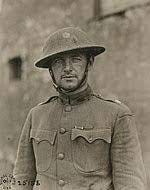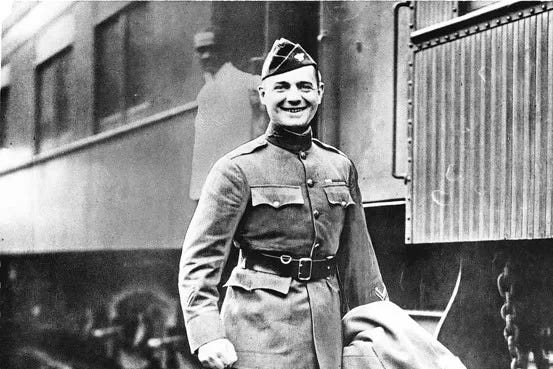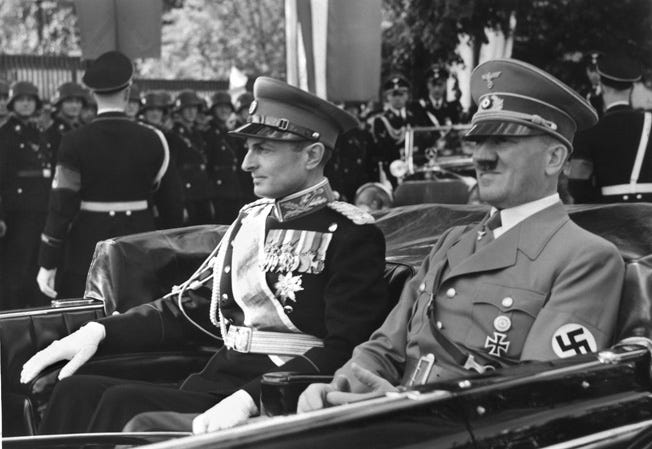President Dwight D. Eisenhower called him, “The last hero.” That was at the funeral of William Donovan, who was known as “Wild Bill” Donovan. This was an incredible man, born in Buffalo in 1883, who accomplished so much for our country. He should always be remembered as a great American.
Donovan was most certainly a hero, 10 times over. He led an amazing life! He was smart, educated, a great speaker and principled man. His mother, Anna, and father, Timothy, were both first generation Irish-Americans. They raised five children, Bill the eldest. His family wasn’t wealthy, but were most definitely upper middle class. Tim Donovan headed up the local railroad yard before going on to manage Holy Cross Cemetery. He even tried his hand at politics but didn’t succeed. Young Bill’s traits of independence, leadership, toughness and love of country were passed down to him by his father.
Donovan began his college studies at St. Joseph’s College where he played football and acted in plays, showing a talent for oratory. He then went on to Niagra University for pre-law studies, before transferring to Columbia University, where he earned his law degree. Franklin Delano Roosevelt was one of his classmates, and whereas FDR was a quiet, back row, fairly unimpressive student, Bill Donovan appeared to be a young man with a great future ahead of him in 1905. He was an exemplary student, speaker, athlete, handsome and had a confident and determined way about him. No question, he gained the attention of FDR during those school years.
After becoming a lawyer, he returned to his hometown of Buffalo in 1909 where he joined the law firm of Love & Keating. Two years later, his independence led him to start his own firm with Bradley Goodyear, which became Goodyear and O’Brien in 1914. That same year, he married Ruth Rumsey, a “society girl’’ from a wealthy Buffalo family. Money would never be an issue in his life.
It was during this time, 1912, when Donovan began his real career serving his country. He formed and became the leader of a cavalry troop attached to the New York National Guard. A few years later, 1916, his troop was sent to the Mexican border to support the American campaign against Pancho Villa. He was very interested in the military, but also had showed interest in acting, as he took lessons from Eleanor Robson, a star of the stage in New York at that time. He never pursued an acting career, but merely used those skills in his future endeavors. They served him well.
When President Woodrow Wilson declared America’s entrance into World War I following the sinking of the Lusitania by a German U-boat off the coast of Ireland, Bill Donovan quickly enlisted. He fought in many campaigns, leading the 1st battalion, 165th Infantry of the 42nd Division, in France. He was shot and injured by shrapnel and blinded by gas. But he was always determined to fight on, even after being shot.
He won several medals for his bravery including the Croix de Guerre for sprinting through enemy fire to perform a rescue. In another battle, he was awarded the Distinguished Service Cross for leading his men in an attack during the Aisne-Marne campaign in which hundreds of soldiers in his regiment were killed. Hollywood made a movie about the battle titled, The Fighting 69th starring Jimmy Cagney. When he entered his next battle at Landres-et-Saint-Georges, he was known as “Wild Bill” because of his incredible endurance and determination, even under the worst of conditions and great danger. At one point in this deadly firefight, he had been shot in the leg, but continued fighting and encouraged his men to do the same. He once again received the Distinguished Service Cross.
After returning from the war, he went back to work as a lawyer, but soon found himself traveling to the Far East on a vacation that turned into more of an intelligence gathering project about Japan, Korea and China. He even traveled to Siberia during the Russian Civil War and later to Europe, all for the purpose of gaining an insight into communism. After returning home, thanks to the efforts of Father Duffy, the army chaplain who had been with him during the battle at Landres-et-Saint-Georges, Donovan was awarded the Medal of Honor. The leader of the Fighting 69th refused the medal saying it belonged to all of those soldiers who died in that battle. By this time, his service in World War I and movie made about him, turned him into a bit of a national celebrity in America.
With the fight in Europe over, Donovan took that fighting attitude to his law practice. Prohibition was now the law of the land and when gangster bootleggers in Buffalo used their muscle to gain territories and sell their beer, Donovan went after them. Regardless of the death threats he received, including a promise to blow up his home, Wild Bill conducted raids to stop the criminals. And, he didn’t limit his raids to the corner bars. No, one of his raids was at his own country club, where many of those he knew very well soon found out he didn’t make exceptions. This created an issue between his wife and he as she didn’t appreciate him making them social outcasts in Buffalo.
Luckily for their marriage, they wouldn’t be in Buffalo much longer, because his efforts led to a position in Washington, D.C. when President Calvin Coolidge appointed Harlan Stone Attorney General and Donovan was named his assistant in charge of the criminal division. Later, when Stone was named to the Supreme Court, Donovan took charge of the Department of Justice antitrust division. Donovan did not get along very well working with the head of the FBI, J. Edgar Hoover, so he resigned in 1929 and moved to New York where he set up a new law practice, just as the stock market crashed. He was soon managing mergers, bankruptcies, acquisitions and serving several famous clients including Mae West. A few years later, he ran on the Republican ticket for Governor of New York, but lost handily to the Democratic candidate Herbert Lehman.
Now think of this. He is in his late forties by this point and look at all he has accomplished. Well, he was just getting started.
He continued his law practice but spent a good deal of time gathering intelligence on foreign affairs. He had been in a war. He saw how it was started. He could see how the world was changing, especially during The Great Depression. So back to Europe he went and this time met with Italian dictator Benito Mussolini. He learned a great deal from Mussolini, and was granted access to the Italian military which was fighting in Ethiopia. He was impressed by the improvement of the Italian army since the end of World War I. Donovan also met with Nazi leaders to gain insight on how that party had taken over Germany and was quickly setting a new agenda.
Seeing these all-controlling dictatorships, he warned President Franklin Delano Roosevelt and the country that another major war in Europe would take place. He alerted Americans about the great dangers that would occur in the world if those evil dictators - Mussolini, Hitler and Stalin – were successful. Then in September of 1939 when the Nazi’s and USSR invaded Poland, the start of World War II, FDR sent Donovan to Britain to determine if they were able to stand up to the German army. Wild Bill spent a good deal of time with Winston Churchill and the two became fast friends. But he also learned about the British intelligence service, which thoroughly impressed him.
When he returned to America, he urged President Roosevelt to support the English war effort and start a similar intelligence organization in the United States. Roosevelt was all in, but had to determine a way to get around a congressional ban on selling military equipment to Britain. At the same time, the British pleaded with Roosevelt to replace the U.S. Ambassador in England, Joseph P. Kennedy, with Donovan. Word spread through the media about the differing views of Kennedy, who wanted to stay out of another war completely, and Donovan who knew that war was inevitable and better to support the British and prepare America.
FDR sent Donovan to the Pacific region to assess the U.S. Navy, then to the Middle East to urge leaders to fight back against the Nazis. When he returned to America, he worked closely with William Stephenson, a British spy, who helped Donovan form the basis for the Office of Strategic Services (OSS), the new United States intelligence agency. It started in July of 1941, when FDR signed an order and named Donovan as the Coordinator of Information (COI). At this time, each military service operated their own intelligence groups, which were not linked to the other armed services and poorly organized.
Donovan was not viewed positively by those groups. Nonetheless, he knew the importance of having a national intelligence organization and moved ahead to establish offices for the COI in New York, asking Allen Dulles to head up the group. For all intent and purposes, this was the start of the OSS, which became official in 1942 and placed under the control of the Joint Chiefs of Staff. Whereas some questioned the OSS, General Dwight D. Eisenhower, General George Patton and General George Marshall were all supporters.
And, the OSS played a highly important role. Many Americans are aware of how the OSS orchestrated a fake army in Operation Quicksilver, assembled in southeast England to look like an invading force led by General George Patton would be storming the beaches at the Pas-de-Calais. That strategic maneuver definitely tricked the Germans and helped allow the true D-Day invasion to take place and succeed farther north.
On Utah Beach during that historic day, Donovan went in after the initial wave, but found himself under fire and pinned down on the beach. As he lay there on the sand with Colonel David Bruce, who headed covert operations, he told Bruce that they could not be captured, because they knew too much. At one point that looked like a real possibility and Donovan told Bruce, they would have to kill themselves. They didn’t have poisonous suicide pills with them, so Donovan informed Bruce that he would shoot him first and then take his own life. Luckily, it never reached that point. Imagine if that had happened?
Donovan survived the war and went on to do so much more in his life, including helping to form the Central Intelligence Agency. He is truly a highly accomplished American who is exactly what Ike said of him, “An American hero!” His accomplishments in life are too numerous to detail in a blog, but if interested, there is an excellent book by Douglas Waller titled, Wild Bill Donovan.
He died on February 8, 1959 at the age of 76 from complications of vascular dementia and is buried in Arlington National Cemetery.











